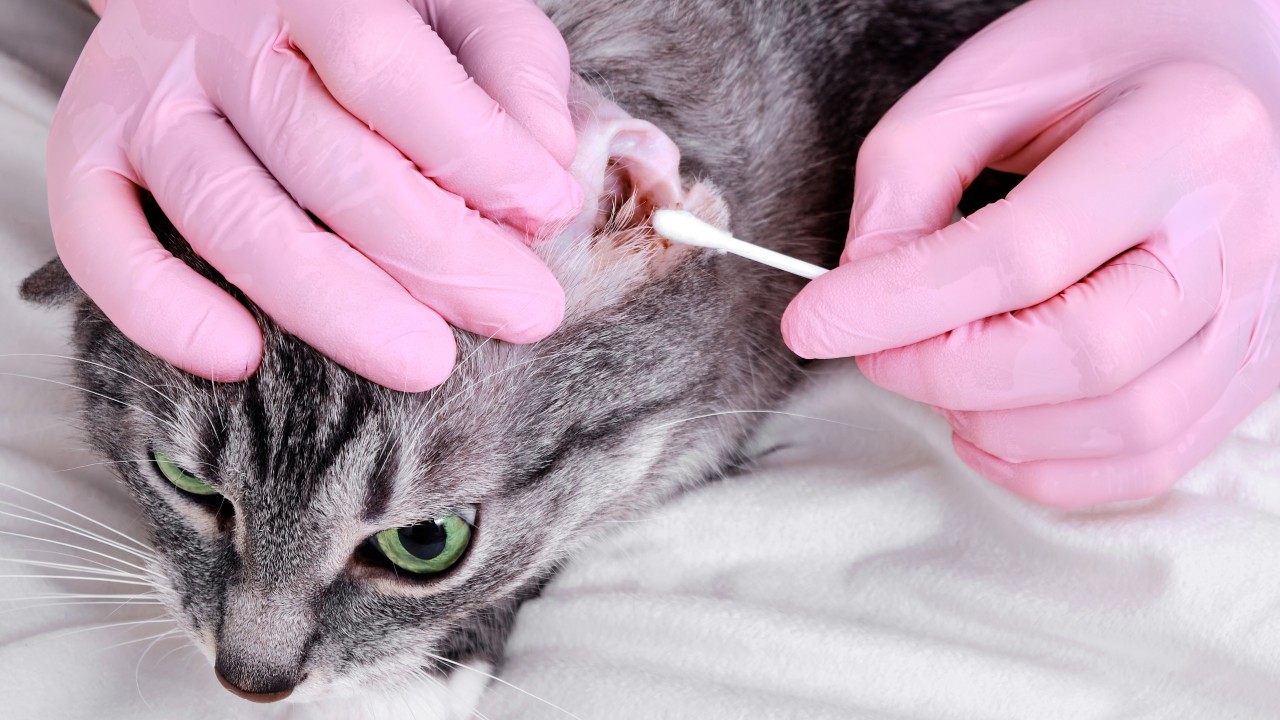A vet’s guide to ear mites in cats
Ear mites in cats need to dealt with quickly to avoid infestation and further health problems

Ear mites in cats are a pesky parasite that most commonly affects kittens, particularly those from crowded situations such as shelters and catteries. Adult cats, dogs, and other pets can also be affected by ear mites, so it’s important to get to the bottom of this problem right away! The good news is that ear mites are easily treatable and there are no long term ill-effects as long as the infection is treated promptly. Read on to learn more about ear mites, and what to do if you suspect your cat or kitten has encountered this itchy problem.
- Best pet insurance: Make pet emergencies less stressful
- Best flea treatments for cats: Stop your cat scratching
What are ear mites?
Ear mites, also known by their scientific name Otodectes cynotis, are highly contagious parasites that live in the ear canal and on the pinna, or the external portion of the ear. These mites feed on skin debris, causing inflammation and irritation of the skin in the ear canal. Ear mites are an extremely common cause of ear infection in cats, especially in kittens. Adult cats seem to have some resistance to ear mite infection, although infection is still possible and some adult cats can become asymptomatic carriers of ear mites. According to the Companion Animal Parasite Council (CAPC), when infected with ear mites cats can have more than 1,000 mites per ear!
How do cats get ear mites?
Ear mites are transmitted between hosts by close contact. This means that your cat must come into contact with an infected cat in order to get ear mites. Ear mites commonly spread in areas such as shelters and catteries, where animals are in close quarters. Kittens and young cats under one year of age are most susceptible to becoming infected with ear mites. Ear mites can also be spread from cats to other pets in the household. Once ear mites are identified in one pet in the household, it is essential that all pets in the household are treated for ear mites to prevent further spread of the parasite.
What are the symptoms of ear mites in cats?
Ear mites are notoriously itchy! One of the first symptoms pet owners will notice is frequent scratching at one or both ears, shaking of the head, and general discomfort. Other symptoms of ear mites in cats include:
- Buildup of dark brown to black discharge in the ear canal
- Debris in the ear canal that looks like coffee grounds
- Hair loss and scabbing around the ears and face from scratching
- Odor from the ears
- Extreme itching
If you suspect your cat may have ear mites, it’s important to see your veterinarian for appropriate treatment. Ear mites can spread to other pets in the household, so it will be necessary to treat all of your pets for ear mites to stop the spread of the parasite.

How are ear mites in cats treated?
There are two ways that your veterinarian may treat ear mites in cats. One option is to treat ear mites topically, by applying a miticidal (mite-killing) medication directly to the ear canal. Depending on the type of medication used, multiple treatments may be needed to kill all of the parasites.
Another option is to use systemic treatment such as flea and tick preventive products. These products will kill the ear mite infestation with one application on the back of your pet’s neck. Products typically used to address ear mite infections include Revolution (selamectin), Advantage Multi (imidacloprid/moxidectin), and Bravecto (fluralaner). These products are available through your veterinary clinic.
Sometimes secondary ear infections with bacteria or fungi occur due to the damage and inflammation caused by ear mites. In these cases, your veterinarian may also prescribe other topical ear medications to help clear the ear infection. Be sure to follow your veterinarian’s instructions for treatment closely and return to the veterinary clinic for any recommended follow up appointments, so you can be sure that your cat’s ear infection has completely resolved.
Can ear mites in cats be prevented?
The best way to prevent ear mites in cats is to avoid contact with any animal known to have ear mites. However, if one pet in the household has been diagnosed with ear mites, it is safe to assume that all pets in the household have already been exposed. For this reason, it is recommended that all pets in the household be treated for ear mites. This will stop the infection and ensure that your pets do not continue to spread ear mites to each other. Your veterinarian will prescribe appropriate treatment for each pet in your household depending on their species, age, weight, and the severity of the infection.
Can ear mites in cats be treated at home?
Do not attempt to treat your pet’s ear mites at home with over-the-counter treatments or home remedies. Although some sources may claim that putting mineral oil, coconut oil, or vinegar in your pet’s ears will kill the mites, this is incorrect. These methods will not adequately control the mite infestation and may cause your cat to develop bacterial or fungal infections of the ear. You should never put anything into your cat’s ear without first consulting your veterinarian. If you suspect your cat may have ear mites, see your veterinarian for appropriate diagnosis and treatment. Ear mites are extremely itchy and uncomfortable, so your cat will thank you for the prompt treatment!
Ear Mites in Cats: An Itchy Nuisance
Ear mites in cats can be a nuisance, but fortunately they are easy to treat with appropriate medications from your veterinarian. Most importantly, all pets in the household will need to be treated to stop the spread of ear mites. Luckily, once treated, your pets should have no lasting ill-effects from their bout of ear mites!
PetsRadar Newsletter
Get the best advice, tips and top tech for your beloved Pets
Dr. Elizabeth Racine is a small animal general practice vet covering all things pet health and wellness. Her special interests include veterinary behavior, nutrition, and internal medicine.
As a freelance writer, Dr. Racine has written content for major companies in the industry such as the American Kennel Club, Merck Animal Health, Bayer PetBasics, Elanco, and CareCredit. In her free time, Dr. Racine enjoys playing trampoline dodgeball, hiking with her beagle Dasher, and spending time with her three mischievous cats.

